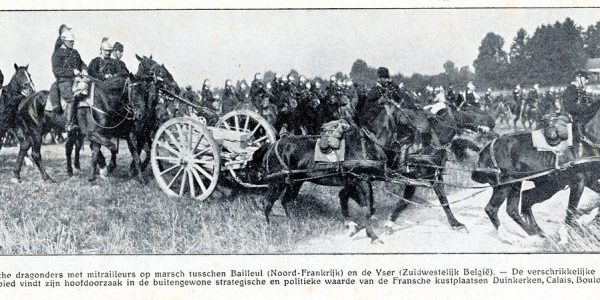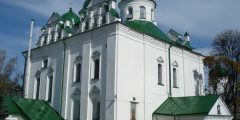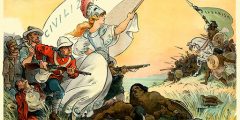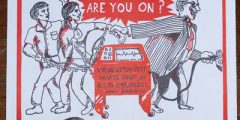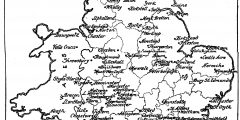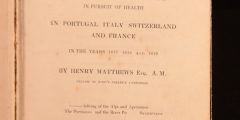Britain’s entry into the First World War, seen through a wonderful tranche of Open Access articles from Prof. John Young
May 18, 2020
Among the many items available on ‘Open Access’ from the Department of History at the University of Nottingham are four articles, by John W. Young, which aim to deepen our understanding of Britain’s decision to declare war on Germany in 1914. The first of these articles is ‘Conservative Leaders, Coalition, and Britain’s decision for war …
Dr. Liudmyla Sharipova’s new article on double monastaries in The Historical Journal
May 11, 2020
Double monasteries came into existence at the time of Christian antiquity. Men and women religious lived within the boundaries of the same cloister or in close proximity to each other, but did not share quarters. The rationale behind their foundation was that double monasteries gave women a degree of protection against external threats, ensured that …
Dr. Sascha Auerbach in The Independent
May 2, 2020
Dr. Sascha Auerbach, who is a Lecturer in Modern British and Colonial history, was recently interviewed and quoted at length in The Independent. His expertise in the history of colonialism and imperialism was sought by the editors to provide an historical perspective in the ongoing debates over the legacies of the British Empire. Asked to comment …
The Midlands Historical Review–Editor Lucy Mounfield describes Nottingham University’s own interdisciplinary arts and humanities journal!
February 13, 2020
Midlands Historical Review was established in 2017 by a group of PhD students from the History department at the University of Nottingham. Their original aim to start a peer-review interdisciplinary journal providing a platform and learning repository to showcase excellent research in the field of the arts and humanities is still at the forefront of …
Dr. Gwilym Dodd’s new article in the English Historical Review, “County and Community in Medieval England”
The English Historical Review, Volume 134, Issue 569, August 2019, Pages 777–820 The ‘county community’ is something of a hot potato amongst late medieval political historians. Since the publication of an influential article by Christine Carpenter in 1994, in which she condemned the county community as anachronistic and conceptually flawed, research on the political structures …
Nottingham Medieval Studies 63, Special Issue, “Heretical Self-Defence”
Nottingham Medieval Studies is pleased to announce the publication of Volume 63 (2019), which is a Special Issue featuring the proceedings of the ‘Heretical Self-Defence’ conference organised by the Medieval Heresy and Dissent Research Network (MHDRN) and hosted here at Nottingham at Easter 2018. https://www.nottingham.ac.uk/humanities/departments/history/research/research-projects/current-projects/medieval-heresy-and-dissent.aspx= The conference addressed themes and questions raised in modern …
Sheryllynne Haggerty starts Leverhulme Fellowship
November 20, 2019
This year, courtesy of support from a Leverhulme Research Fellowship, Dr. Sheryllynne Haggerty will be working on a new monograph tentatively titled “Merchants and Managers; Sojourners and Slaves.” Her goal is to produce the first in-depth examination of the lives of ordinary Jamaican people at the start of the Seven Years’ War (1756-1763). A rare …
David Robinson’s new article on the mutual constitution of European and Imperial history
October 20, 2019
This month, we highlight David Robinson’s article, “Morals, Manners, and Marriage: Domestic Discourse in Eighteenth- and Nineteenth- century Italy and Britain,” which appeared in the January issue of the Journal of British Identities. David writes: “this paper has emerged from my PhD research, which compares British travel accounts of India with those of Italy, from around …
Deserters from the British Civil Wars
January 18, 2019
Historians have long been interested in the huge numbers of vagrants who trod the roads of early modern England, David Appleby writes, and whether the ‘rogue’ literature of the time genuinely reflected (or incited) a widespread panic about such travellers. Their enquiries have fed into a wider debate which seeks to understand how communities grappled …
Reading the Holy Name of Jesus in the 15th Century
December 7, 2018
At some point between 1420 and 1450 the Yorkshire gentleman Robert Thornton of Ryedale copied a number of English and Latin texts on devotion to the Holy Name of Jesus into his own book (now called the Lincoln MS 91). As Rob Lutton shows in a new article (see link), Thornton and other medieval Christians …

